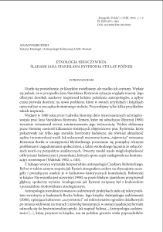Tytuł pozycji:
Etnologia nieoczywista. Śladami Jana Stanisława Bystronia sto lat później
24 cm
Over a hundred years ago, Jan Stanisław Bystroń became the head of the Department of Ethnology at the University of Poznań (original name Wszechnica Piastowska). He has left a huge collection of books and articles as his scientific achievements, which still inspire new generations of ethnologists and social researchers. His most intense scientific activity was during the inter-war period, in which first as a professor at the University of Poznań, and then at the Jagiellonian University and the University of Warsaw, he co-created the foundations of ethnological sciences in Poland. This article focuses on two main areas: institutional (vision of ethnology as academic science) and issues of cultural heritage. The presented text does not refer to the entire academic output of Bystroń, but above all concentrates on the years 1919–1925 – the period when he managed the Department of Ethnography in Poznań. For Bystroń it was a time of intensive academic work and the beginning of formulating many research ideas that evolved later. Ethnology, in the understanding of Bystroń, has made a kind of reorientation in the approach to the problems of the nation, folk, regionalism, language phenomena and history (for example Polish folk history). Many threads are also considered pioneering and sometimes controversial today. His theory of culture is also a pretext for reflection on the contemporary dilemmas of Polish ethnology, such as: the disciplinary identity, the boundaries between sciences, the role of cultural capital and knowledge transfers
